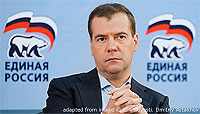Medvedev says ruble ‘undervalued’ as slide slows

(Business New Europe – bne.eu – bne IntelliNews – December 17, 2014) Russian Prime Minister Dmitry Medvedev called the ruble undervalued at a meeting on December 17 with the top officials of the government, the central bank and heads of Russia’s largest exporters. He said that regulation of the currency market would remain based on market principles, but the presence of the heads of the largest exporters indicates that they could be asked to sell more hard currency revenues.
“Everyone knows that the ruble is undervalued,” Medvedev said at the meeting. “The exchange rate is adrift from the fundamentals and does not reflect the real situation in the economy.”
Medvedev said the government would take a “whole series of obligatory measures” to stabilise the currency, including “increasing supply of hard currency refinancing loans to banks [and] ensuring a balance between supply and demand by means of increasing the supply of hard currency liquidity where necessary”.
By midday on December 17 the dramatic fall in the ruble had slowed, with the Russian currency down 1.6% from the open at RUB68.58 against the dollar.
The meeting was attended by the heads of oil companies Rosneft, Lukoil, Tatneft, Bashneft and Surgutneftegaz, gas giants Gazprom and Novatek, metals giants Norilsk Nikel and Severstal, and diamond producer Alrosa. Their attendance at the meeting suggested to analysts that the government will request that the mostly state-owned companies voluntarily repatriate more hard currency revenues to strengthen the ruble.
Government officials had earlier dismissed any reintroduction of obligatory sales of foreign currency by exporters. And Medvedev argued there was no need for formally reintroducing stricter currency controls. “There is no need to apply excessively tough regulations in this sphere, which we already had during a certain period. They didn’t do anything useful,” he said.
Analysts are increasingly accusing the Russian authorities of mismanaging its communications over the ruble crisis, creating a crisis of confidence on the market, and Medvedev’s largely anodyne comments are unlikely to have gone any way to correcting this impression.
“We view the current market to be on the verge of a confidence crisis: even though economic growth was in positive territory until very recently, budget risks are still manageable, foreign debt is modest and there is a current account surplus, the FX market is pricing in a deep crisis and putting under question the sustainability of the CBR’s [Central Bank of Russia] policy,” writes Alfa Bank’s Natalia Orlova.
“We believe that the main reason for the current confidence crisis is miscommunication between the CBR and the market. The market is focused on the ruble exchange rate, and the CBR’s refusal to address the concerns of the FX market is damaging communication,” Orlova continues, concluding that, “complete disregard of the market’s view at the moment is creating a credibility problem for the CBR, not the market.”
Moody’s Investors Service is one of the few voices sharing the government’s continued sang froid in the face of the ruble carnage of ‘Red Tuesday’ on December 16, when the ruble plummeted by over 10% despite a huge 6.5-percentage-point overnight interest rate hike.
Moody’s said its Russian rating would not necessarily be affected by what it called “short-term” market swings. “Moody’s ratings reflect a medium-term view of risk and therefore are not necessarily affected by short-term asset price fluctuations,” the agency told Bloomberg.
[featured image is file photo]
